- Home
- S. D. Perry
Star Trek: Terok Nor 02: Night of the Wolves Page 2
Star Trek: Terok Nor 02: Night of the Wolves Read online
Page 2
“So—tell me what you think of Bajor,” Dukat said.
Damar hesitated, unable to look away from the lush panorama. Dukat was pleased with the hesitation, a sign of careful consideration, perhaps a weighing of words to find those that would most impress the gil’s commander. Dukat had taken a special interest in Damar, was grooming him to be his own personal assistant, and knew that Damar understood the honor of being so singled out. In truth, pickings had been lean; today’s Cardassian soldier, while certainly still the best trained in the quadrant, left something to be desired in an intellectual capacity. Corat Damar, fresh from officer training, stood out because he thought further ahead than his next meal, his next kanar, his next sexual conquest. Dukat enjoyed seeing a sharp mind at work, and, in truth, there was no satisfaction in being admired by a fool. He wanted his personal aides smart enough to appreciate his maneuverings.
And they do deserve appreciation, Dukat thought, smiling. I’m here, aren’t I?
“How can these people…” Damar began, then shook his head.
Dukat understood. “It seems hard to imagine that the Bajorans could have just squandered all this natural wealth for so long a time.”
“I…suppose they were content with their lot in life as it was, and perhaps they—”
Dukat chuckled. “I believe the word you mean to use is complacent, Gil Damar.” He gestured with an open hand. “The Bajorans have only the most rudimentary understanding of what you and I would call progress. The abundance of their world has made them lazy and superstitious. They can scarcely grasp scientific explanations for natural phenomena, preferring to give credit to their ‘prophets’ for anything they don’t understand.”
Damar was silent. He’d know nothing of Bajoran religion, of course, a low officer from the homeworld, but he’d learn. Most of the ground troops and station guards never bothered, but if he was as bright as Dukat believed, he’d pick it up.
“Of course, as prefect, I do not intend to disrespect their beliefs,” Dukat said. “As backward as their religion may seem, I believe it is in the Union’s best interests to allow the Bajorans to continue to worship as they did before the annexation. Some of my predecessors didn’t share my view, but I feel that certain concessions must be made to the Bajorans if we are to successfully mold them into dutiful Cardassian subjects. As it is, they have no appreciation for us, because they fail to see all the good we’ve done for them. They choose to focus only on the inevitable episodes of petty discord that come with any cultural modification. They’re like children, clinging to outmoded comforts, afraid to move forward. I intend to change that.”
Damar’s expression was appropriately deferential. “You’re going to revolutionize relations with the Bajorans, sir.”
Dukat smiled paternally and placed a hand on Damar’s shoulder before a brief, high-pitched tone sounded. Comm from the bridge.
Dukat pressed his comcuff. “What is it?”
“We’re approaching the station, sir.”
“I’ll be right there. Computer, end this program.”
The panoramic views that surrounded them skittered and vanished, revealing a dark chamber outfitted on all sides with imaging diodes. Dukat enjoyed watching Damar struggle to maintain an expression of indifference to the abrupt change. Holodeck privileges were usually reserved for upper-echelon officers.
“Shall we?” Dukat asked, gesturing toward the door, and the young man fell in at his side. Together, they walked toward the central main corridor of the Galor-class vessel. Soldiers stopped to salute as the two men headed for the bridge, the gul nodding pleasantly in turn. Each and every one of them would be under his direct command.
Returned, in triumph, he thought, holding his head ever higher. This was a great day for him. He had been partly responsible for securing Bajor’s allegiance to the Union, but politics had kept him from his rightful place as overseer to the annexation. His “punishment” for alleged missteps, a protracted stint as warden of the Letau prison facility, had turned out to be a prime opportunity; it had given him a chance to display his acumen as a leader, while removing him from the treacherous power struggles taking place in Central Command. He’d had time to cultivate alliances, to subtly discredit his detractors, to work his way to a position that would allow for this exultant return. Now he was prefect of Bajor; he was back to command the fortress station that rose in the Bajoran sky each night, to make his name synonymous with Cardassian superiority. He was where he belonged.
“Sir, I…Thank you, sir, for the opportunity,” Damar said as they neared the bridge. “For the simulation.”
Dukat smiled. “It’s a small thing, to be sure, but I suppose when I was a third-tier gil—of course, we didn’t have anything like current holosuite technology in those days.”
Damar nodded. “Perhaps when I’m able to take some leave, I’ll be able to go to the surface and see the real thing.”
“You may be able to do that, Gil Damar, although I would advise you not to underestimate the responsibilities of military personnel on the station. And—if I’m not mistaken—your betrothed will be on the surface, will she not?”
Damar’s face flushed. His affianced was with the Information Service, if Dukat recalled correctly. Vela, Veja, something like that.
“Yes, sir. She’s at the Tozhat settlement.”
“Well, then. I imagine your time on the surface will probably not be spent climbing mountains.”
Damar grinned foolishly. They stopped outside the bridge, the gil obviously hesitant to assume an invitation, and Dukat gestured for him to step ahead, feeling generous.
“The ship is approaching our new home, Gil. Would you like to come to the bridge?”
Damar positively glowed. “Yes, sir.”
“Very well. Let’s go and have our first look at Terok Nor.”
Lenaris Holem had given up trying to keep his right leg from cramping. It was the moisture in the weather today, the swollen clouds above him threatening to spill their contents. He couldn’t remember how long he’d been in this line, and since he didn’t have a timepiece, there wasn’t any effective way to be sure without asking someone else. He knew better than to ask the woman sitting on the ground behind him—old Thera Tibb was a notorious jabberbox, and the last thing Lenaris needed was to be trapped listening to her endlessly embroidered anecdotes about her children. Anyway, Lenaris was fairly certain she was asleep, which gave testament to how slowly the line was moving.
Lenaris looked at the man in front of him. He was approximately the same age as himself, in his late twenties or early thirties, with very sharp ridges on his broad nose, and a wild tangle of uncut curly hair. His clothes were rough, even shabbier than Lenaris’s own. He most likely didn’t have a timepiece, either. Still, Lenaris was so bored and uncomfortable, he thought he might as well strike up a conversation.
“Do you have any idea how long we’ve been standing here?” he ventured. It was always a little ill-advised to speak to strangers when one was away from home. If the person you spoke to happened to belong to a higher D’jarra, he or she might take offense at your attempt to engage in conversation, depending on their caste. But many Bajorans—Lenaris among them—held those things in much lower esteem since the effects of the Cardassian occupation had become more widespread.
“I believe we’ve been here since first morning prayers.” The man nodded at the glint of B’hava’el, piercing a thin ray through a break in the cloud cover overhead. “So, assuming my knowledge of the sun’s position is correct, we’ve been here for at least six hours.”
“Six hours!” Lenaris exclaimed. “I knew it had been a long time, but—”
“I could be overestimating,” the stranger admitted, “but if I am, it’s only by half an hour or so. I’m certain first morning prayers were going on when I got in line, and you didn’t come along much later than that.”
Lenaris folded his arms and sighed. These food ration lines were getting more intolerable by the day. His stomach wa
s empty, aching from the days since he’d had a substantial meal. “I can’t believe the spoonheads put us through this, day after day,” he muttered, “and still have the gall to claim that they’re trying to help us.”
“The…what? Did you say…spoonheads?”
Lenaris cleared his throat. It was unwise to throw around such a blatant slur, when there were collaborators everywhere. “I mean, uh…”
The other man laughed. “I don’t know if I’ve heard that before,” he said. “Spoonheads. It does suit the Cardies, doesn’t it?” The stranger stuck out his hand. “My name is Ornathia Lac, by the way. Or just Lac.”
Lenaris took the man’s hand and shook it. “Lenaris Holem. Where are you from, Lac? I don’t believe I’ve heard of the Ornathias.”
“Oh, I’m not from around here.” He seemed not to have any inclination to speak further, but Lenaris was bored. He eyed the other man’s earring.
“A farmer?” Holem asked carefully.
The man nodded, but said nothing else.
Lenaris went on, trying to put Lac at ease. “My mother came from farmers. She married outside her D’jarra.” He chuckled, and then clutched at his stomach at a mild twinge caused by the laughter. He was pretty sure he had been working on an ulcer for the better part of a year. “She always had a rebellious streak, which my father says I inherited. She was from the farmlands near the northern Relliketh province—is that where you come from?”
“No,” Lac told him. “I come from inland of the Tilar peninsula, across the channel.” He held out his hand, palm up, and looked toward the sky. “Did you feel a drop?”
Lenaris shook his head. “By the vineyards? What are you doing all the way over here?”
“The vineyards are part of my family’s old estate,” Lac answered, conspicuously ignoring the latter part of the question. “Though the Cardies took part of it over a decade ago, when they were still trying to colonize, my family still controls some of that land.”
Lenaris nodded, curious as to how Lac had come to be at Relliketh. The only way to get across the channel was to go by Cardassian ferry or skimmer, and he wondered why the farmer would go to such trouble and expense. The man didn’t offer any further explanation, however, so Lenaris thought he’d do best to let it lie.
“So,” Lac said, after a moment of silence. His eyes flicked to Lenaris’s earring, a rather plain one that did not include his family’s caste designation. “What’s your D’jarra?”
Lenaris was a bit taken aback; it had once been considered impolite to inquire about a person’s D’jarra, if he didn’t display it on his earring, or offer the information when introducing himself. But times had changed, and Lenaris supposed there wasn’t any reason not to tell the man. “Va’telo,” he said.
Lac’s eyebrows did a little jump. “You’re a pilot?” he asked, sounding hopeful. Most Va’telo were pilots, though some were boatmen, and in the old days, many had driven the groundcars.
“I was a pilot,” Lenaris corrected him. “I used to do some transport work before the spoon—er—Cardassians shut down the textile mills along the channel. Times have been lean for a long while, though. I had to…sell my ship.” It pained him to speak of it even now, two years later.
Lac nodded sympathetically. “The Cardies have disrupted nearly everyone’s life, I suppose. My family still farms some of our land, but production is down to a tenth of what it was—and then the Cardies take most of it anyway, to meet quotas. It might seem backwards for a farmer to be standing in a food ration line, but—”
“Nothing makes sense anymore,” Lenaris agreed.
Lac was quiet again, and Lenaris wondered if he hadn’t said something wrong. The farmer was difficult to read. Lenaris shook his cramping right leg back awake again, not sure if he should continue the conversation.
“Have you ever flown a warp vessel?” Lac suddenly asked.
Lenaris laughed sharply. He’d been barely a boy when the Cardassians started to restrict warp travel. “How old do I look to you?” he said, then instantly regretted what might be perceived as unkindness in his tone. “No,” he said. “I haven’t. My father, of course—but he’s long gone.”
“Did your father ever tell you anything about flying a warp vessel?”
Lenaris swallowed. “A few things,” he said. He looked down at his feet as he thought of his father, who had died from a simple untreated infection when Lenaris had still been in his teens. The Cardassians had placed a week-long block on travel between provinces after a terrorist strike, with no exceptions. Hemmed into a particularly remote area in Relliketh, Lenaris Pendan had died before a medic could get to him. Another indirect casualty of the occupation.
Lac nodded. “I didn’t mean to make you uncomfortable,” he offered.
“No—it’s all right, it’s just—I don’t particularly care to think about my father.”
“Oh,” Lac said. “Was it…Cardies?”
Lenaris shrugged slightly. “More or less.”
Lac looked apologetic. “I don’t mean to sound so…forward. It’s just that…well, I think I’ve heard your name before—and then when you said you’re a pilot—”
“A pilot without a ship,” Holem reminded him. This conversation seemed mired in depressing topics.
“You won’t need a ship,” Lac told him. “I have one.”
Lenaris’s eyebrows shot up, but Lac went on as if he hadn’t just said the unlikeliest thing one could have expected from a farmer.
“I do recognize your name,” Lac said, his voice taking on a confidential tone. “You know Tiven Cohr, don’t you?”
Lenaris was no less surprised. “I…” He wasn’t sure whether to confess to it or not. Tiven Cohr was involved with Lenaris’s old resistance cell, a group he hadn’t associated with for the better part of a year. This was not the sort of thing one was generally eager to discuss with a stranger.
“Look, Lenaris,” Lac said, suddenly sounding a bit urgent. “I know we just met, but…you seem reasonably trustworthy. And if I’m right about that…” He lowered his voice. “I have something to show you that, as a pilot, you might find interesting.” He glanced at the overcast sky. “That is, if we ever come to the end of this line.”
As if on cue, it began to rain, at first the slightest suggestion of cold drops prickling the back of Lenaris’s neck, and then an out-and-out downpour. He crossed his arms tightly across his chest, sniffling as the water soaked his hair and rolled down the tip of his nose.
“What kind of thing?” he asked Lac, who had assumed a similar posture.
Lac smiled mysteriously through the sheets of rain, and leaned closer, to speak to Lenaris over the plunking and splashing all around them. “It’s a warp ship,” he whispered. “A Bajoran warp ship.”
Lenaris stared in disbelief. “Where?” he asked.
“I’ll show it to you,” Lac told him, wiping the water out of his eyes. “But first, I want you to do something for me.”
“What’s that?” Lenaris said uncertainly, shivering in the rain.
“Take me to Tiven Cohr.”
“I can’t,” Lenaris said, feeling slightly relieved. He didn’t want to get mixed up in whatever this fellow was proposing, especially if it involved Tiven Cohr. “I don’t know where he is.”
Lac looked disappointed. “But…could you find out?”
Lenaris frowned, poking his toes in the edges of the deep puddles that were suddenly emerging. “I don’t know,” he said.
The rain was beginning to let up, as quickly as it had started. Lac gave it another try. “You couldn’t even maybe tell me where you last saw him? Anything like that?”
Lenaris grimaced. They were coming closer to the front of the line, where they would soon be within earshot of the collaborating Bajorans who ran the ration checkpoints. “I suppose…there are a few things I could tell you,” he said.
Lac grinned. “Then it’s settled,” he said. “I can take you to my shuttle tomorrow.”
“Your s
huttle?” Holem said. He hadn’t intended to sign on for whatever it was Lac was offering, but the farmer only nodded. Holem was bursting with questions, but as the line edged closer to the ration station, he could not ask them. He would have to be satisfied with finding out after he’d received his rations, and with the way his stomach was churning, he hoped the food would taste better than it smelled.
Professor Mendar cleared her throat loudly, and several of her students sat up a little straighter in their chairs. Miras Vara absentmindedly tapped a stylus against the surface of her padd, trying not to think about lunch. This class, a required postgrad overview of the Cardassian territories, was always difficult for Miras because of its unfortunate time slot. She was sure that many of the students, if not most, had the same problem. It didn’t help that the content of the course was mostly irrelevant to Miras’s primary concentration, homeworld agriculture. She’d spent six years studying ponics and soil components, and enjoying every minute of it; a quartile of politics and geography, treaties and borders, and she was bored stiff.
“Today, we begin our study of Bajor,” the professor said, her hair a sleek black helmet on her rather mannish head. “I have prepared a brief presentation. I hope it will illustrate the importance of the development of new weapons for the future of our world, and open a discourse on ways in which we might better incorporate alien cultures.”
Miras stifled a yawn and programmed her padd to download the images from the mainframe.
“I have to warn you that some of this material may be disturbing,” the professor continued, and Miras sat up straighter, glancing over at Kalisi. Her classmate arched one delicate ridge, smiling slightly. The other students murmured to one another.
“Quiet, please. These are uncensored images, given to us by a correspondent for the Cardassian Information Service. She has risked her life many times to bring the truth about the Bajoran annexation to the Cardassian people. Normally, these images would not be displayed for the general public to view, as there are those who would manipulate this kind of material as ammunition for dissent. However, I am confident that my graduate students know better.”

 The Umbrella Conspiracy
The Umbrella Conspiracy Zero Hour
Zero Hour Caliban Cove
Caliban Cove Code: Veronica
Code: Veronica Nemesis
Nemesis Underworld
Underworld The Summer Man
The Summer Man Virus
Virus Shadow of the Tomb Raider--Path of the Apocalypse
Shadow of the Tomb Raider--Path of the Apocalypse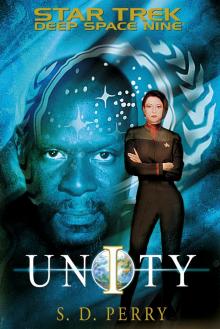 Unity
Unity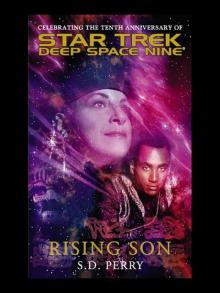 Rising Son
Rising Son Resident Evil: Underworld
Resident Evil: Underworld Resident Evil – Caliban Cove
Resident Evil – Caliban Cove Resident Evil – Nemesis
Resident Evil – Nemesis Resident Evil – City of the Dead
Resident Evil – City of the Dead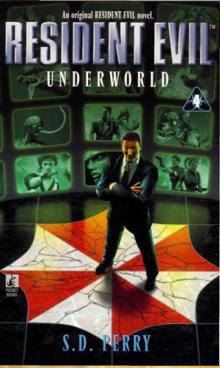 Resident Evil – Underworld
Resident Evil – Underworld Star Trek: Terok Nor 03: Dawn of the Eagles
Star Trek: Terok Nor 03: Dawn of the Eagles Twist of Faith
Twist of Faith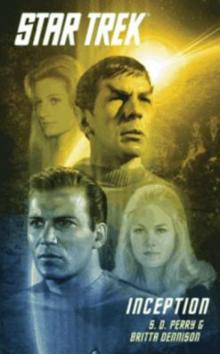 Star Trek: Inception
Star Trek: Inception Cloak
Cloak Resident Evil
Resident Evil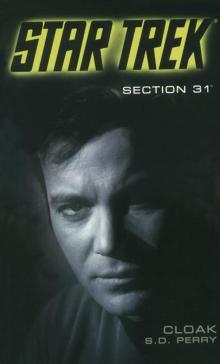 Star Trek - TOS - Section 31 - Cloak
Star Trek - TOS - Section 31 - Cloak Star Trek: Terok Nor 02: Night of the Wolves
Star Trek: Terok Nor 02: Night of the Wolves